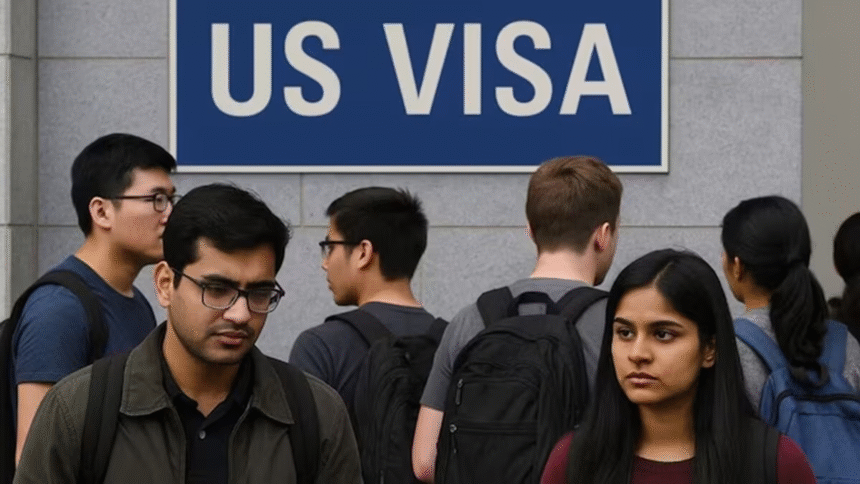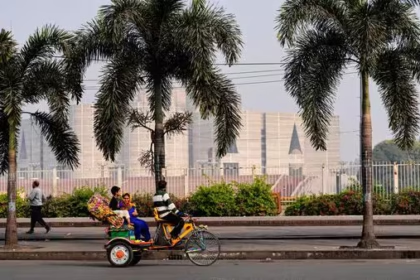US Hikes Visa Fees for Indians: New Rates ₹16,000 to ₹40,000 for Tourists, Students Starting August 2025
US Visa Integrity Fee: Indian applicants planning to visit the US for tourism, study, or work will face significantly higher visa costs starting 2026
Under his ‘Big Beautiful Bill’ that was signed on July 4, US President Donald Trump has introduced a new ‘Visa Integrity Fee’ of $250 for most non-immigrant visa categories.

Indian applicants planning to visit the US for tourism, study, or work will face significantly higher visa costs starting 2026. A typical tourist visa, which used to cost under Rs 16,000, could now cost over Rs 40,000.
The US Visa Integrity Fee is a new $250 (Rs 21,400) non-refundable surcharge added to existing visa costs.
- It will be mandatory at the time of visa issuance.
- Comes into effect from 2026.
- The fee will be adjusted annually based on inflation, as measured by the Consumer Price Index (CPI).
The fee applies to most non-immigrant visas, including B-1/B-2 (tourist and business visas), F and M (student visas), H-1B (work visas), and J (exchange visitor visas). Only diplomatic visa holders in categories A and G are exempted.

For Indian travellers, this means that students, tech professionals, tourists, and business travellers to the US will all be impacted by the additional charge.
Currently, a US B-1/B-2 visa costs $185, which is over Rs 15,800.
With the addition of the Visa Integrity Fee, along with other minor fees like the I-94 fee ($24) and ESTA fee ($13), the total cost will rise to about $472, or Rs 40,502.
This is over 2.5 times the current visa cost. For students or employees applying for visas like F or H-1B, the costs will also see a sharp rise.
While the fee cannot be waived or reduced, it may be refunded under certain conditions. If the visa holder complies with all visa terms, such as leaving the US within five days after their visa expires or legally extending their stay or changing status (example – getting a green card), they may be eligible for a refund.
If a person overstays or violates visa rules, the refund will not apply.
The US government has introduced this fee as a security measure to encourage lawful conduct among foreign nationals visiting the country. It is designed to act as a security deposit, incentivising visitors to follow the rules of their visa.
The US Department of Homeland Security (DHS) will manage this policy and has the power to revise the fee amount every year, based on inflation.
Apart from the Visa Integrity Fee, Trump’s 900-page ‘One Big Beautiful Bill’ also includes a 1 per cent excise tax on remittances, which will make it costlier for immigrants, including Indians in the US, to send money back home. This is a legislative effort to tighten immigration policies and increase revenue from foreign nationals living or working in the US.
New Delhi, July 11, 2025 — In a move that will significantly impact Indian travelers and students planning to visit or study in the United States, the U.S. State Department has announced a steep hike in visa fees, effective from January 2025. The new fee structure will see costs for various visa categories rise sharply, with tourist and student visas now ranging between ₹16,000 and ₹40,000 (approx. $190–$480).
The revised rates come as part of a broader update in U.S. consular services, aimed at aligning visa processing costs with inflation, increased security measures, and rising demand post-pandemic.

According to the U.S. Embassy in India, the updated fees will apply to both non-immigrant and student visa categories:
- B-1/B-2 Tourist/Business Visa: ₹16,000 (approx. $190)
- F-1 Student Visa: ₹21,000 (approx. $250)
- J-1 Exchange Visitor Visa: ₹20,500 (approx. $245)
- H-1B Work Visa: ₹40,000+ (approx. $480)
- L-1 Intra-Company Transfer Visa: ₹39,000+ (approx. $470)
This marks a significant increase from the earlier fees, which ranged between ₹11,500 and ₹29,000, depending on the visa type.
In a public notice, the U.S. State Department stated that the revised visa fees are part of a routine review of service costs. The fee hike, it said, is necessary to:
- Support growing demand for U.S. visas, particularly from India, which accounts for the second-highest number of international students in the U.S.
- Cover the costs of enhanced security protocols and technology upgrades at U.S. consulates worldwide.
- Address inflationary pressures and rising operational expenses.
The announcement has triggered mixed reactions across India, especially among students aspiring to study in the U.S. With the rupee-dollar exchange rate currently hovering around ₹83 per dollar, the fee hike poses an additional financial burden.
For instance, a typical Indian student applying for an F-1 visa will now have to pay close to ₹21,000, excluding additional costs such as SEVIS fees, document processing, and travel expenses, which can push total pre-departure expenses well above ₹1.5–2 lakhs.
Education consultants and travel agencies expect short-term hesitation among budget-sensitive applicants, although the long-term demand for U.S. visas remains strong.
Frequent business travelers and tourists may also feel the pinch. The ₹16,000 B-1/B-2 visa fee for short visits has seen a 35% increase from previous levels. Industry insiders believe that this may dampen travel interest among Indian tourists and small business owners exploring opportunities in the U.S.
However, premium travelers and established professionals are expected to absorb the cost as part of standard international travel expenses.
The new visa fees take effect in January 2025.
Applications filed before the implementation date will still be charged under the old fee structure.
Applicants are advised to check the official U.S. embassy or consulate websites before scheduling interviews or making payments.
No additional changes have been made to visa validity, eligibility criteria, or interview waivers.
Read Also : Gurgaon Tennis Star Radhika Yadav Murder: Father-Killer Sent to 1-Day Police Remand








